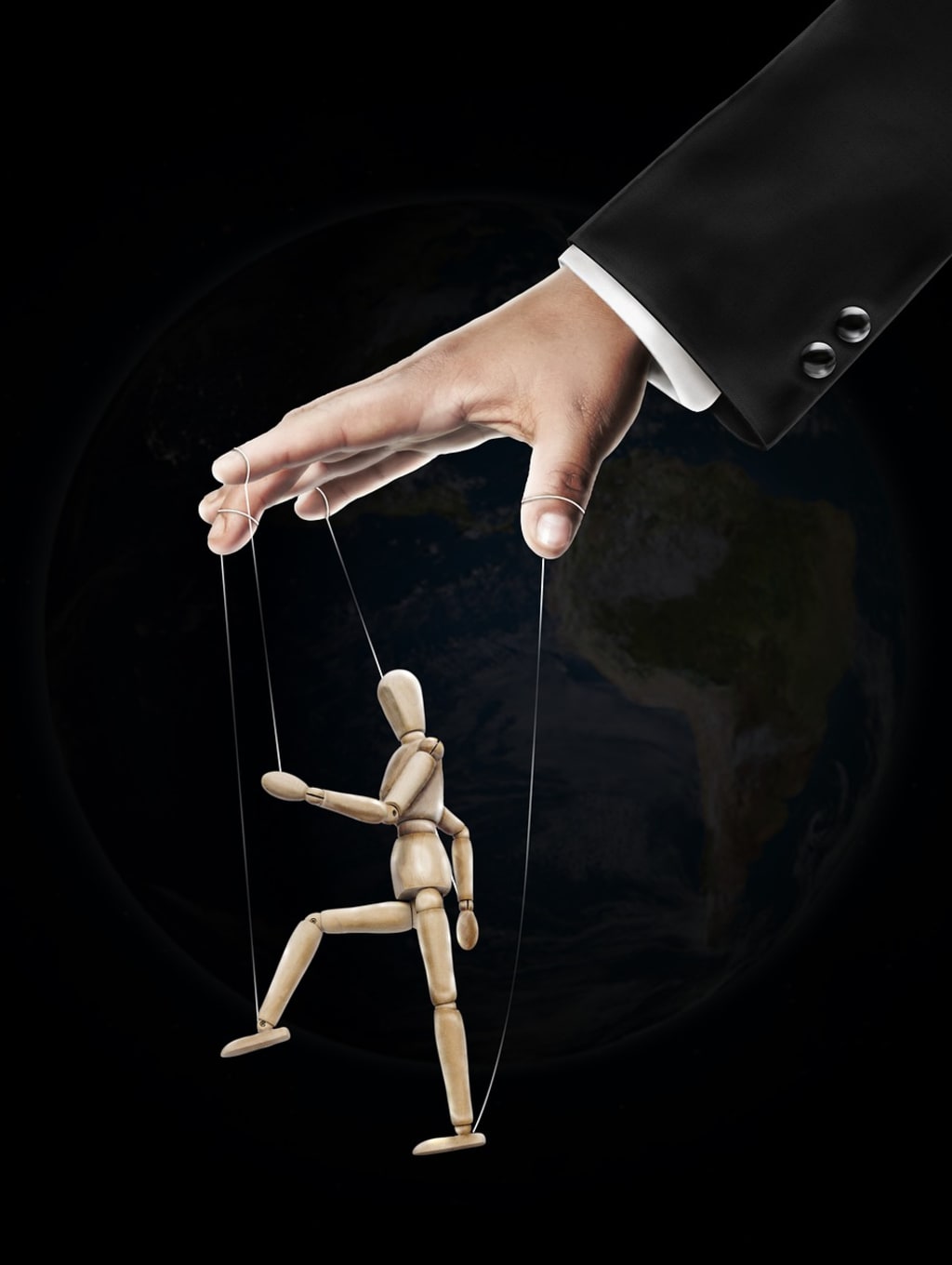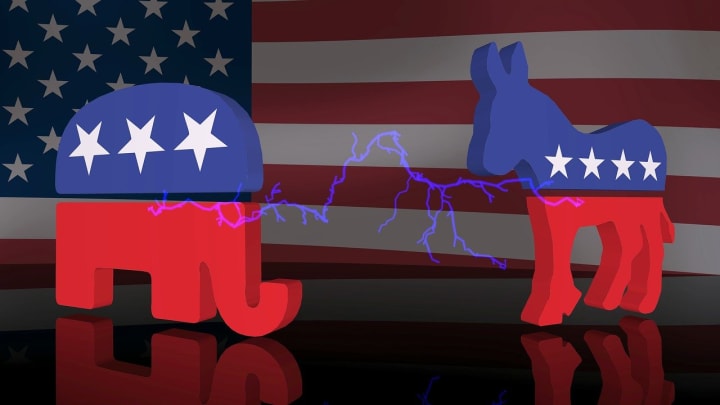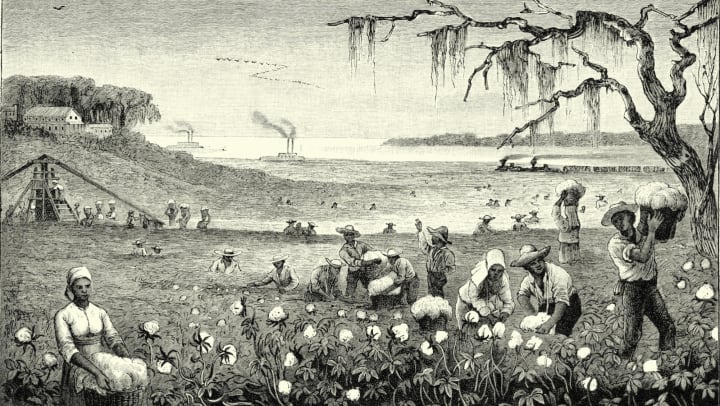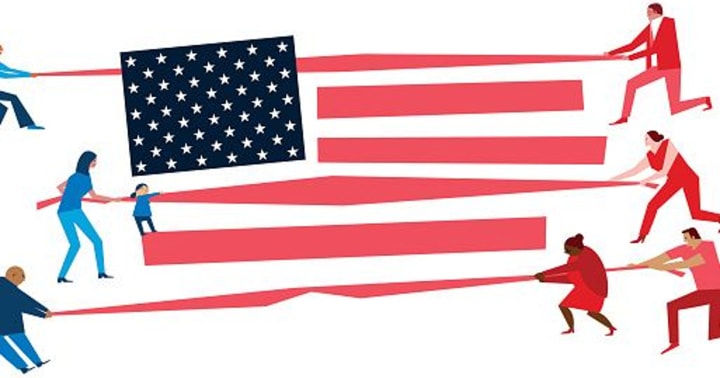Politics: An American Tragedy
The Dual Party System Is A Tool Of The Wealthy Elite

The year is 1796. Weathered, worn down, and plagued with illness a man steps out to address the masses for the last time. Many of his friends had long passed and his opponents hounded him endlessly. This was a man who had led thousands into battle and had endured incredible hardships. A man who had overseen the founding of a new nation. Yet now, decrepit, he bids his farewell to public life.
His name is George Washington.
The farewell address he gives is a plea to the nation for unity. And he provides a prophetic warning: “The alternate domination of one faction over another, sharpened by the spirit of revenge, natural to party dissension, which in different ages and countries has perpetrated the most horrid enormities, is itself a frightful despotism.”
Even then, he knew, that partisanship would ultimately tear the country apart. And now, 224 years later, we are seeing just that...

The Birth Of The Dual Party System
The birth of the Democratic Party can be traced back as far as 1792 where it was originally known as The Republican Party, or Jeffersonian Republicans. The party was founded with strong anti-monarchal views and believed in a decentralized government with very limited powers. In 1798 the party adopted the label of Democratic-Republican as the official name. By 1820, the Democratic-Republican party had no opposition as the Federalist Party, which had been led by Alexander Hamilton ceased to exist.
The Nation was undergoing many changes during this period of time. As more states entered the Union, voting laws began to relax and states passed laws allowing for the people to vote for presidential electors directly. As a result, the Democratic-Republican party began to splinter into factions.
A major turning point came during the presidential election of 1824 when neither Andrew Jackson nor John Quincy Adams secured the required majority of electoral votes. The question of the presidency was brought to the House of Representatives for a vote which was won by John Quincy Adams.
There were irredeemable differences in the political philosophies of Adams and Jackson. Where Adams' faction supported Eastern interests and styled themselves as National Republicans, Jackson's faction supported Southern and Western interests and assumed the label of Democrats (or Jacksonian Democrats).
In 1844 the Jacksonian Democrats officially became the Democratic Party. The Democrats would go on to win nearly every election until 1856.
The Question of Slavery

Slavery became one of the most polarizing issues during the 1850s. In 1854, a new anti-slavery party was formed labeled The Republican Party. There were no widespread calls for the abolition of slavery at this time. The southern states relied heavily upon slave labor following the invention of the cotton gin, which increased the speed in which cotton could be processed.
The Republican Party did not set out to end slavery but rather to stop its spread into other states. With the Democratic Party split between southern and northern democrats on the issue of slavery, the Republican Party won the presidential election of 1860 with Abraham Lincoln as its candidate. The 1860 election is considered by most historians to be one of three critical elections in the history of the United States.
The 1860 election cemented two party rule and the country's politics would be perpetually dominated by two main political factions: Republicans and Democrats.
The Consequences of a Dual-Party System
For 160 years the United States has endured a dual party system with political parties that possess opposing ideas. This system has resulted in citizens having to choose one absolute over another with no room for compromise. Other minor parties have sprouted, such as the Libertarian party, but have been unable to gain any significant political traction.
With no room for compromise, political differences have become drastic to the point of severe and sometimes violent contention. A common belief has formed that compromise is tantamount to surrender. As a result, bipartisan cooperation diminishes.
Political agendas form based on which party holds power. Separation of powers is intended to keep each branch of government (Executive, Legislative, and Judicial) in check. The legislative drafts laws, the president signs or vetoes, and the judicial confirms that laws conform to restrictions given in the Constitution. But what happens when a political party holds absolute power in all three branches?

A party holding all power in government is free to push its agenda without the need for compromise. This ultimately means that only one segment of the population has their interests represented, while the other segments are ignored. Laws are passed that are wholly unpopular and as a result, the population becomes discontent.
Divisions become more glaring amongst the population as power changes hands from one faction to the other. Suddenly to affiliate with one political party or another is to showcase your ethical and social standing - even if you don't necessarily ascribe to all of the beliefs of that particular party.
You are a Republican or a Democrat. Even if you declare yourself independent of a political party either faction will view you as either an ally or an adversary. The dual party system leaves no room for neutral entities.
Political Differences or Class Warfare?

What is the role of money in politics? In 2016 the average presidential bid cost $2.4 billion dollars. There are countries whose gross domestic product (GDP) is less than this. The cost of a senate race is pegged at around $19.4 million dollars. To run for a congressional seat, the price tag is around $1.6 million.
What does this mean to the average American? It means that obtaining a political office is well beyond them, even if they want to serve and have valuable ideas they could contribute. It means that political office is reserved for a select few - either the independently wealthy or the well-connected.
Power has been consolidated into the hands of an elite few - who give only lip service to the needs of the "average" American but are utterly out of touch with the struggles of everyday people.
Laws are passed that provide nearly negligible benefits to the poorest classes while granting enormous benefits to the wealthy.
Special interests, who funded these exorbitantly expensive campaigns, treat their officeholders as investments and expect them to create and pass laws that provide a return on their investment. Political candidates are beholden to wealthy benefactors - not the people they purport to represent.
The Dual Party System - The Preferred Instrument of The Wealthy Elite

The dual party system provides the perfect cover for the wealthy elite to continue to consolidate wealth and power. The ordinary people remain polarized around policy issues, distracted as a tiny few continue to prosper. The elite recognize that if people became uniformly aware of this disparity, it would be the French Revolution redux.
To those who hold political office in one party or the other, they don't ever really lose. If a bill sponsored by a Republican fails to pass, the stock market tumbles and presents a buying opportunity for savvy investors - including their special interest benefactors. If the bill passes, they earn political prestige.
The polarizing differences of the two parties keep the masses distracted, fighting bitterly against one another. All while a handful of politicians, CEOs, and investors continue to profit.
What Is To Be Done?

The first step towards progress is realizing the problem with this country isn't our differences - it's failing to see what makes us all the same. We can have differences in opinions, beliefs, and philosophies. We can still respect each other in spite of our differences. Once we can look past this, we can begin to focus on what created these divides in the first place.
Every major social issue we have can be traced back to one significant cause - the struggle between the classes. But we must pay attention to where that struggle is taking place. The poor aren't resentful of the wealthy - they resent the class directly above them, the middle class. The middle class isn't resentful of the wealthy - they contend that poor people want them to pay to have some semblance of a life.
Meanwhile the wealthy elite continue to become wealthier at the expense of both the poor and middle classes.
To right this imbalance we must all fight for opportunity equality and resist the monopolistic tendencies of the wealthy. Everyone should have the opportunity to succeed, whatever that means to them. This is something that everyone can agree on - Republican or Democrat. Don't be a pawn in the games of the privileged few any longer.
About the Creator
Bryan Rhodes
Bryan Rhodes is author of the self-published eBook "The Mini MBA" and co-author of "The Entrepreneur's Playbook." He holds a Bachelor's degree in Information Technology and a Master's degree in Business Administration.






Comments
There are no comments for this story
Be the first to respond and start the conversation.